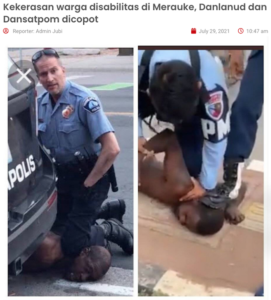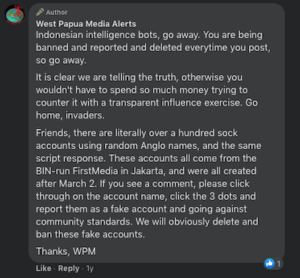SPECIAL REPORT: By David Robie
It is open season again for Indonesian trolls targeting Asia Pacific Report and other media with fake news and disinformation dispatches in a crude attempt to gloss over human rights violations.
Just three months ago I wrote about this issue in my “Dear editor” article exposing the disinformation campaign. There was silence for a while but now the fake letters to the editor – and other media outlets — have started again in earnest.
The latest four lengthy letters emailed to APR canvas the following topics — Jakarta’s controversial special autonomy status revised law for Papua, a brutal assault by Indonesian Air Force military policemen on a deaf Papuan man, and a shooting incident allegedly committed by pro-independence rebels – and they appear to have been written from a stock template.
And they all purport to have been written by “Papuan students” or “Papuans”. Are they their real names, and do they even exist?
The latest letter to Asia Pacific Report, dated July 30, was written by a “Paulus Ndiken” who claims:
“I’m a native Papuan currently living in Merauke, Papua, Indonesia. I would like to address your cover story about Indonesia apologises for ‘excessive force’ against deaf Papuan man.
“One day after the incident, the Indonesian Air Force had detained and punished severely 2 members … that had roughly apprehending [sic] Esebius Bapaimu in Merauke, Papua province.”
Dubious reputation
The letter linked to Yumi Toktok Stret, a website with a dubious reputation with accuracy. The report was sketchy and the correct name of the assaulted man, according to reputable news media and Papuan sources, is actually Steven Yadohamang.
“We regret that this kind of rough-housing [sic] happened on the street,” wrote correspondent “Ndiken”, “but we, as Papuans, [are] also glad to know that these perpetrators have received sound punishment …
“Responding to the unfortunate events, the Indonesian netizens had asked for the Indonesian military to immediately take action against the guilty party and were glad that the institution had addressed the people’s concern in a very fast manner.”
A more nuanced and accurate article was written for Asia Pacific Report by Brisbane-based West Papuan academic Yamin Kogoya who compared the “inhumane” assault to the tragic killing of George Floyd in the United States after a white Minneapolis police officer, Derek Chauvin, pressed his knee on Floyd’s neck for nine minutes as he lay face down in the street on 25 May 2020.


Another letter writer, “Michel Wamebu” … “a native West Papuan living in Merauke”, said on June 29 he would like to bring our attention to West Papua, “which has been painted as if the whole island is in conflict, when actually [there are] only a few small areas [that] were invaded by the Free Papua terrorists that had been exposed to enormous violence.
“I would like to assure the world that there [is] nothing like a full-blown war.”
In the lengthy letter about an incident on June 4 when four civilians were killed in a shooting and two were wounded, “Wamebu” provided alleged details that are likely to have been provided by military sources and at variance with actual news reports at the time.
‘Spike’ over special autonomy
“Yamkon Doleon”, a “student from West Papua and currently studying in Yogyakarta, Indonesia” wrote on July 19 that there had been “a spike in the topic of Papuan special autonomy in social media and also [in] a few international media”.
Launching into a defence of the new Special Autonomy for Papua law for the governance of the two Melanesian provinces of Papua and West Papua for the next two decades – adopted by the House of Representatives in Jakarta last month without consultation with the Papuans, “Doleon” wrote:
“The Special Autonomy itself is a law that guarantees every Papuan to be the leader of their region, to have free education, free health service, and a boost I [the] economy … So which article is not in favour of the people?”
The writer makes no mention of the heavy militarisation of Papua in recent months, the repeated allegations of human rights violations, or the rejection of the Special Autonomy law by the Papuan people.
In a comment about the spate of Indonesian troll messages to some media outlets, West Papua Media Alerts said:
“Indonesian intelligence bots, go away. You are being banned and reported and deleted everytime you post, so go away.”
The engaged media advocacy and news service continued: “It is clear we are telling the truth, otherwise you wouldn’t have to spend so much money trying to counter it with a transparent influence exercise. Go home, invaders.
“Friends, there are literally over a hundred sock accounts using random Anglo names, and the same script response. These accounts all come from the BIN-run FirstMedia in Jakarta, and were all created after March 2.

Report fake accounts
“If you see a comment, please click through on the account name, click the 3 dots and report them as a fake account and going against community standards. We will obviously delete and ban these fake accounts.”
Meanwhile, the London-based Indonesian human rights watchdog Tapol has strongly condemned the two Air Force military policemen who severely beat the disabled man, Steven Yadohamang, in Merauke, Papua, on 27 July 2021.
Video footage which has been widely shared on social media, shows the two personnel beating up a man and crushing his body into the ground and stamping on his head.
The footage of the assault on Steven Yadohamang. Video: Benar News
Tapol said in a statement: “It is clear from the footage that Yadohamang does not possess the capacity to defend himself against two individuals who appear to be unconcerned with possible consequences.”
A similar incident in Nabire took place the following day, said the statement. A West Papuan man, Nicolas Mote, was suddenly smacked on the head repeatedly during his arrest despite not resisting.
“The incident follows a spate of previous violent incidents committed by the security forces against civilians in West Papua province and is likely to raise further questions about what purpose increasing numbers of military personnel are serving in West Papua,” Tapol said.
Although the Air Force had apologised, it had suggested that the two military policemen, Second Sergeant Dimas Harjanto and Second Private Rian Febrianto, alone should bear responsibility for the incident, said the watchdog.
Outrage over Indonesian officers for stomping on disabled Papuan teen’s head – by Yamin Kogoya #CafePacific #HumanRights #HumanRightsViolations #WestPapua @westpapuamedia @FreeWestPapua #justice4papuahttps://t.co/tolA6q0EgS pic.twitter.com/1oJVYp7gSk
— David Robie (@DavidRobie) July 29, 2021
‘Pattern of violence’
“They, and the Indonesian media, have described the soldiers as ‘rogues’. This assessment is not consistent with a pattern of violence committed against civilians that has been allowed to go unpunished in recent months and years,” Tapol said.
“Indeed, had there not been such indisputable visual evidence of security force violence, it is entirely possible that the incident would not now be subject to further investigation by the authorities.
“But despite facing punishment, the perpetrators are likely to only to receive light sentences because they will be tried in military courts.”
Following the end of the New Order period, civilian politicians were not pushing for military personnel to be tried in civilian courts.
Since 2019, there had been a steady build-up of military and police personnel in the two provinces of Papua and West Papua, said Tapol.
“Deployments and security force operations have increased further since April 2021, when the Coordinating Minister for Politics and Security, Mahfud MD, designated the armed resistance movement, TPNPB, as a ‘terrorist’ group.
“West Papuans and Indonesians have raised concerns that the designation would further stigmatise ordinary West Papuans.
“We would also highlight that in West Papua there are significant underlying problems with institutionalised racism by the authorities.”
Tapol called on President Joko Widodo and the House of Representatives of Indonesia to finish the post-Suharto agenda of reforming the military to combat a culture of impunity over human rights violations in West Papua.
Article by AsiaPacificReport.nz





